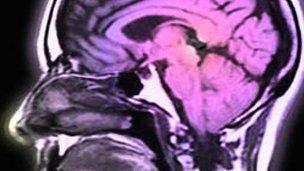Clot drug 'helps stroke recovery', Edinburgh University study suggests
- Published

Blood clots can block normal flow to the brain and cause stroke
Stroke victims given a clot-busting drug after an attack recover better than those without the treatment, an Edinburgh study has suggested.
More than 3,000 patients worldwide took part in the trial of rt-PA.
The drug was given intravenously to patients who have had acute ischaemic stroke, when an artery that carries blood to the brain is blocked.
Stroke damage can be permanent or fatal, with problems including paralysis and problems with speech.
The international trial, led by the University of Edinburgh, found that following treatment with the drug, more stroke survivors were able to look after themselves.
A patient's chances of completely recovering within six months of a stroke were also increased.
For every 1,000 patients given rt-PA within three hours of stroke, 80 more will survive and live without help from others than if they had not been given the drug, according to the research.
But patients are also at risk of death within seven days of treatment because the drug can cause a secondary bleed in the brain.
Without treatment with rt-PA, one-third of people who have a stroke die and another third are left permanently dependent and disabled.
For those who do not experience bleeding, the drug improves patients' longer-term recovery.
Researchers said the trial showed the benefits of treating patients with the drug as soon as possible.
The findings of the study are published in The Lancet medical journal, alongside an analysis of all other trials of the drug from the past 20 years.
Clot data
The study involved stroke patients in 12 countries between 2000 and 2011, half of whom were treated with intravenous rt-PA and half were not. About half of participants were aged over 80.
In 2002 rt-PA was given an EU licence on condition it was used on patients under 80 within three hours of them having an ischaemic stroke.
Professor Joanna Wardlaw, from Edinburgh University, said: "We have looked at data from more than 7,000 stroke patients worldwide.
"What we see is that the drug increases patients' longer-term recovery. But we need to find out why some people bleed and how to reduce this to increase the effectiveness of clot-busting treatment."
The trial was supported by the University of Edinburgh, the Stroke Association UK, the Medical Research Council, EME, the Health Foundation UK and NHS Lothian Health Board.
- Published11 April 2012